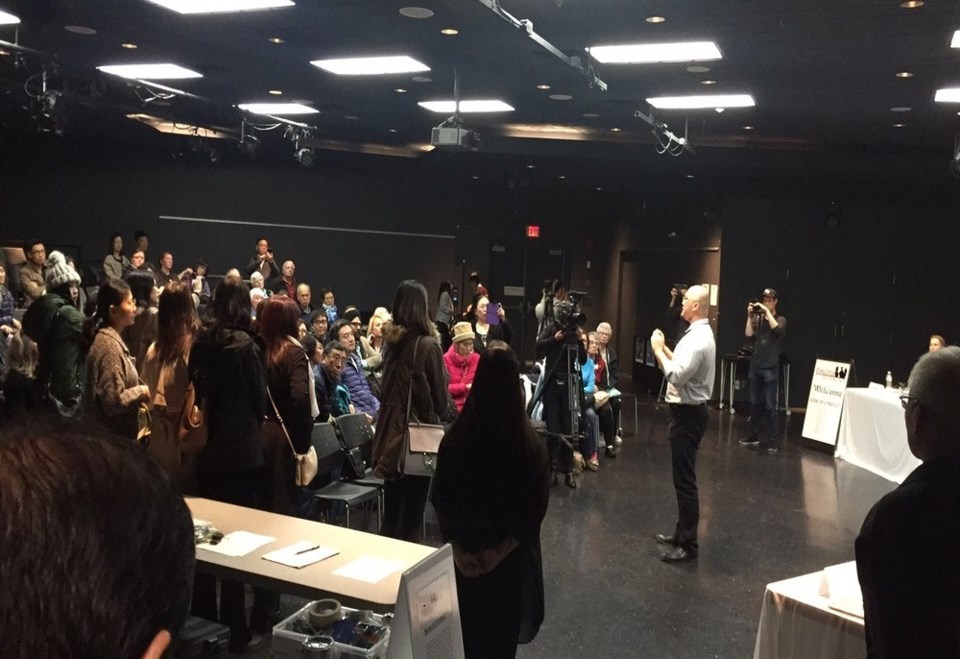A well-intentioned roundtable discussing a controversial homeless housing project on Elmbridge Way was interrupted towards the end by audience members who expressed their anger.
The roundtable aimed to provide a communication platform for supporters and opponents and attracted about 150 people, including Coun. Carol Day and Chak Au.
During the event, representatives from B.C. Housing, RainCity and local non-profit organizations answered questions asked by opposition groups such as the 7300 Elmbridge Group and other strata councils in Brighouse area.
Audience members also wrote down their questions, which were selected and called out by representatives.
However, towards the end of the roundtable, one audience member stood up and interrupted the panel, shouting, “the roundtable is very very unfair. Whoever agrees with me put your hands up,” according to witnesses.
A video showed that around 20 people from the audience raised their hands. Some left their seats and walked to the front of the room, near where the panelists were, and some said, “let’s go” and left the room.
Organiser Henry Yao from Dialogue Richmond tried to calm people down but was interrupted multiple times.
An audience member shouted to the panel, “Why don’t we have the right to talk? The whole meeting is straying from the point.”
“You told us we would talk about whether to build the modular housing here or not, but what you guys have been talking about tonight is what happens after the housing is built. They are two different concepts,” said the audience member.
Another audience member accused the panel of not talking about potential risks to the neighbourhood.
“There was no one person explaining these things to us, (they) just ignored our questions,” she said.
“They have found needles near modular housing in Marpole...who will secure our kids, our elders? Who?...We are here to talk, (but) we can’t display our concerns, we cannot say anything about that?”
Her statement was applauded a few times by some audience members, but others spoke out against this type of behavior.
“Weren’t people given opportunities to ask questions? This is how these things work. This is very democratic. What you are doing is undemocratic,” said one person from the audience.
Yao told the Richmond News that some audience members’ behaviour discouraged dialogue.
“I understand some people weren’t too happy with the answers being provided...but we can’t behave like that. I hate to use this phrase, but it was like a two-year-old’s temper tantrum,” said Yao.
“It made people and the staff worry about their safety and potential safety issues during events like this in the future.”
However David Shao, spokesperson for 7300 Elmbridge Group, told the News that some audience members’ behaviour was “understandable” considering that the event was “very disappointing.”
“We were told it was an event for both parties to have a voice, but it actually turned out to be a one-way explanation for the housing project. What’s the difference between this and the city’s open house in February then?” said Shao.
Shao said the housing authorities did most of the talking and that residents submitted a thick pile of questions but only very few were answered.
“The time given to each of the two parties was very unbalanced, and representatives were very selective when choosing questions from the audience,” he said.
“When the residents were near the end of the event, they would not have had a chance to ask those questions, and they felt like they were being deceived.”
Yao responded that it did take more time for the housing authorities to answer questions, and that there was no such “unfair bias,” which was mentioned by some audience members.
"(The roundtable) is not perfect and we have a lot to do to make it better. At the same time, it is designed only for a certain type of audience to participate in,” said Yao.
He said that after the incident, he and his team need to reconsider the future format of the roundtable. They may go for smaller scale meetings only involving stakeholders’ representatives.
“We really want to continue the dialogue, but if for anything to move forward, we have to see what we can do to structure the next conversation, to make sure everybody feel safe, fell heard, and their concerns can be addressed in a more systematic constructive manner,” said Yao.



